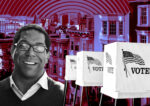An affordable housing bond measure appears headed toward victory in San Francisco, which in early returns Wednesday was leading with 67.7 percent of the vote.
Measure A, which would inject $300 million into subsidized housing, leads a smidgen beyond its required two-thirds majority to pass, the San Francisco Chronicle reported.
The bond comes four years after San Francisco voters approved a $600 million housing bond, the largest in city history.
Measure A stems from a deal between Mayor London Breed and the Board of Supervisors last summer that would cut a requirement for affordable homes in market-rate projects to between 12 and 16 percent, from 20 percent.
It also comes as San Francisco struggles to build new homes. Approvals can take years, driving up costs. A single unit of affordable housing can cost up to $1.2 million, pushed up by land, labor and material prices.
The $300 million would help the city reach a state-mandated goal of adding 82,000 homes in eight years, of which 46,000 must be affordable for low- and moderate-income households.
It would help build up to 1,500 homes while leveraging other funding sources, proponents say.
About $240 million of the money would go toward building new projects, while $30 million would go to rehabbing existing affordable-housing units and $30 million would be dedicated to house people who are dealing with domestic violence, according to the Chronicle.
Measure A drew widespread support from Mayor London Breed, city supervisors and community groups. By election day on Tuesday, the Yes on Prop. A campaign had raised $817,000.
Eric Shaw, former head of the Mayor’s Office of Housing and Community Development, told the Chronicle last year the city would likely spend $120 million to get about half of the 1,500 projects moving this year, then another $120 million in 2025-2026.
Money set aside for preservation would be allocated in 2025-2026 to preserve 60 units of affordable housing. Another 120 domestic violence survivor beds would open in 2027 or 2028.
According to the proposed measure, San Francisco would prioritize housing for seniors and putting affordable homes in wealthy neighborhoods.
The city relies mostly on local dollars to build homes, since the stream of state and federal dollars can be unsteady.
Shaw told the Chronicle that $19 billion in local funds would be needed to achieve the city’s targets.
In 2019, more than 71 percent of voters approved the city’s largest housing bond, at $600 million, not including interest. Voters approved a similar affordable housing bond in 2015 for $310 million, which led to 1,613 affordable homes created or preserved, according to Bloomberg.
— Dana Bartholomew
Read more



